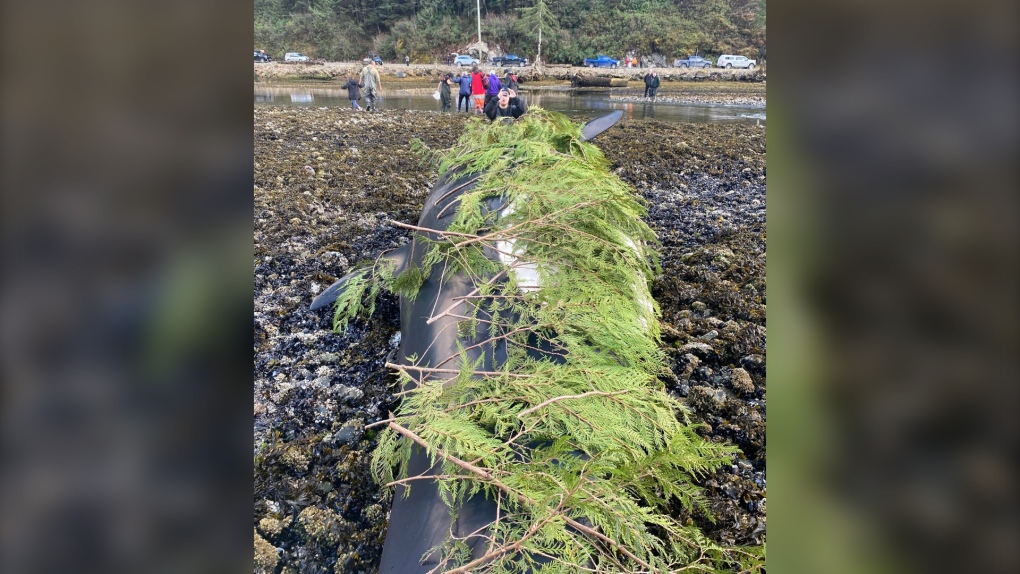'Really sad': Locals describe effort to save beached killer whale on Vancouver Island
As the community mourns a mother killer whale that died after getting stranded on shore Saturday, an effort is underway to reunite her orphaned calf with its pod.
The two whales somehow ended up in the Zeballos Causeway—where the tides are known to change quickly—on northwest Vancouver Island early Saturday morning. The mother was found with a dead seal in her mouth, so the working theory is she was in the area to teach her baby how to hunt.
Resident Stan Price says he was the first to spot the adult orca at daybreak when he was on his way to work. “I watched it for a bit wondering if it was alive or not, and then I could see it was breathing,” he recalled.
Price then radioed Glenn McCall, who owns a local road maintenance company, and he in turn called the Department of Fisheries and Oceans and rallied residents from Zeballos and the Ehattesaht and Nuchatlaht First Nations.
Roughly a dozen people gathered around the beached orca and attempted to save her life. They poured buckets of water on the whale, covered her with towels and tried to flip her over. The orca would struggle from time to time, lifting her tail up and trying to roll, Price remembered.
Despite their best efforts, the orca died around 10:30 a.m., her calf swimming nearby.
“The tide was coming in; that’s where we ran into problems. We couldn’t get her on to her belly,” McCall said. “It was just not enough man power or resources.”
“The local effort here was really astounding,” said Price. “It’s just a really sad day—a really unfortunate time.”
It was Judae Smith’s first time rescuing a whale. She was one of two locals on scene who had received stranded marine mammal training.
“We’d been trained to do this quite a few years back and have never had something like this happen,” she told CTV News. “It was definitely a learning curve for both of us.”
Smith says she’s going to help more community members get that training in the summer, to hopefully ensure a better outcome next time. “It was pretty sad,” she said.
An elder led a traditional ceremony for the kakawin, or killer whale in the Nuu-chah-nulth language. People laid cedar boughs over the orca, sang songs and burnt sage to send her off to the ancestors, Smith recalled.
 Image credit: Ehattesaht Chief Simon JohnThat afternoon, people went out on boats to try and find the calf’s pod. That effort continued into the next day. Smith told CTV News on Sunday afternoon that the calf was still swimming in the small bay where its mother died.
Image credit: Ehattesaht Chief Simon JohnThat afternoon, people went out on boats to try and find the calf’s pod. That effort continued into the next day. Smith told CTV News on Sunday afternoon that the calf was still swimming in the small bay where its mother died.
She said one person was trying to lure the calf out into a safer area, so it can be reunited with its pod as soon as its found.
Meanwhile, crews tied up the mother orca and pulled her to an ideal spot for a necropsy scheduled for Monday.
In an update Sunday, the Marine Education and Research Society, a Port McNeill-based conservation organization, said both whales had been identified. The mother, a Bigg's killer whale, was dubbed T109A3 and was born in 2009, while her calf is approximately one year and nine months old, it confirmed.
The DFO has been on scene through the weekend, and CTV News has reached out for more information.
CTVNews.ca Top Stories

'Canadians deserve a real choice': Justin Trudeau resigning, prorogues Parliament
Prime Minister Justin Trudeau is stepping down as Liberal leader, and is proroguing Parliament as the Liberal Party of Canada embarks on the journey to replace him.
WATCH LIVE Justin Trudeau resigns as Liberal leader: Follow live updates
Prime Minister Justin Trudeau has stepped down as Liberal leader. Follow along for live updates from CTVNews.ca.
'Together, what a great nation it would be': Donald Trump, Elon Musk react to Justin Trudeau's resignation
Amid news of Prime Minister Justin Trudeau's resignation as leader of the Liberal party on Monday morning, reactions from prominent figures began piling in.
Justin Trudeau is resigning, what will be his legacy? A look back at key political eras
In a seismic political move, Justin Trudeau has announced his intention to step down as leader of the Liberal Party of Canada and prime minister, once his successor is named. This decision comes after more than nine years in the country's top job and nearly 12 years at the helm of his party.
Trudeau says Parliament is 'prorogued' until March. What does that mean?
In his resignation speech on Monday, Prime Minister Justin Trudeau announced that Parliament would be prorogued until March, which will give the Liberal party time to find a new leader ahead of an expected confidence vote and early election.
Justin Trudeau resignation: Here's what he said in Ottawa today
Prime Minister Justin Trudeau delivered a speech about his political future Monday morning outside Rideau Cottage in Ottawa. Here's the message he delivered to Canadians.
Alberta government signs new oil and gas agreement with Enbridge
The Alberta government has signed an agreement with Enbridge that Premier Danielle Smith says will increase exports of the province's heavy oil to the United States.
Trudeau leaves mixed global legacy as he exits during turbulent time, analysts say
Prime Minister Justin Trudeau will leave the world stage with a legacy of promoting feminist causes and focusing on Asia, along with criticism that Canada's actions fell short of the government's rhetoric.
Judge condemns murder trial delay, asks lawyers to 'turn around' and look at the public 'we serve'
A Saskatoon murder trial opened on Monday with the judge sharply criticizing the time it’s taken to get to trial.




























